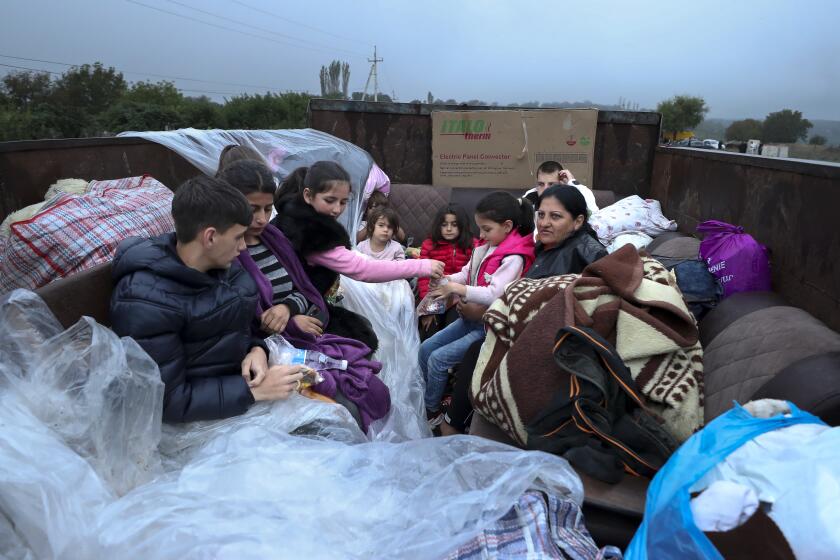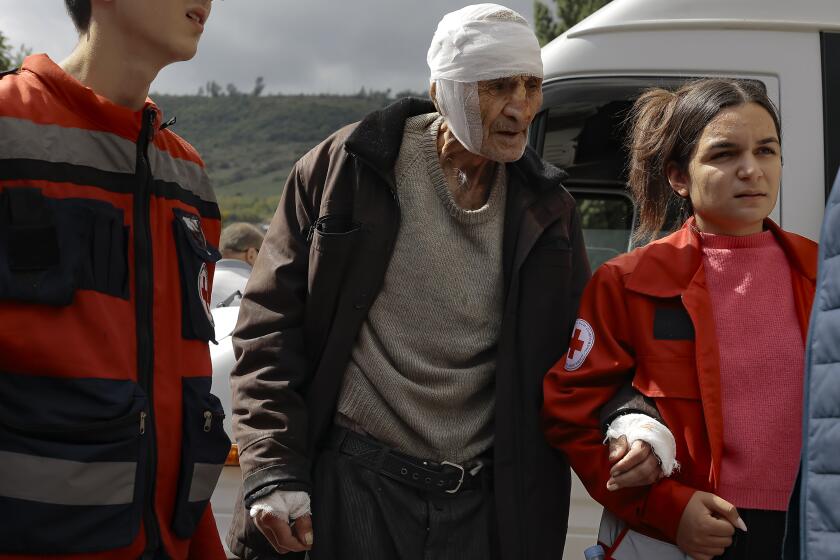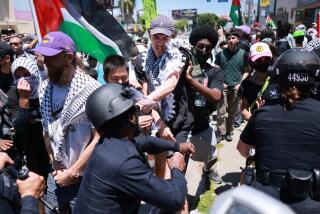Tensions over Armenian crisis in Azerbaijan boil over in reportedly violent protest at USC

The fall of Nagorno-Karabakh, the separatist region of Azerbaijan populated mainly by ethnic Armenians, has spurred condemnation and anger in Southern California, home to a large population of Armenian Americans.
After the long-running conflict in Nagorno-Karabakh escalated in recent years, igniting further protests, Azerbaijan took back the enclave in a lightning blitz last month — leading tensions in L.A. to boil over into violence at one of the latest demonstrations.
On Friday, Armenian protesters at USC allegedly attacked Turkish diplomats, including Turkish Ambassador to the U.S. Hasan Murat Mercan, who had spoken at an event sponsored by the Annenberg School for Communication and Journalism, according to video posted by a Turkish reporter.
Turkey has been a vocal supporter of Azerbaijan in Nagorno-Karabakh, where it has bolstered the nation’s military.
In 1939, Armenians of Musa Dagh fled to Lebanon rather than submit to Turkish rule. Now they despair over the exodus from Nagorno-Karabakh and Azerbaijan.
Video posted to X, formerly known as Twitter, purportedly shows Armenian protesters assaulting members of the Turkish Embassy, according to Burak Dogan, a reporter for a conservative Turkish outlet with close ties to the administration of President Recep Tayyip Erdogan. One man is seen throwing liquid at a diplomat while another man pushes a person and kicks a rolling backpack.
Los Angeles police said major crimes detectives were investigating two reports of battery with possible hate crime enhancements and a report of criminal threats in connection with the incident. No arrests have been made.
USC officials declined to comment and referred all questions to the LAPD.
The Turkish Embassy blamed the clash on “radical Armenian groups,” with protests that included “verbal and physical assaults against our delegation,” it said in a statement on X.
“All legal avenues will be pursued against the perpetrators of physical violence directed at our delegation,” the embassy said.
Ethnic Armenians are fleeing Nagorno-Karabakh over the border to Armenia, as Azerbaijan asserts full control over the enclave Armenians call Artsakh.
Turkish graduate students at USC said the incident “deeply affected our sense of security and belonging.”
“The growing negative attitude towards those of Turkish origin is a cause for serious concern,” the Turkish Graduate Students Assn. at USC wrote in an Instagram post. “We fervently appeal to Turkish institutions and officials to address this issue with the gravity it demands.”
The Armenian Students Assn. of USC distanced itself from the reportedly violent protesters and condemned their actions, saying in a statement that students “exercised exclusively peaceful tactics of civil disobedience and did not partake in non-peaceful acts.”
The association said it had voiced concerns to USC about the event, a conference on the role of public diplomacy in Turkish foreign policy.
“Today and this week, USC subjected its Armenian student population to unimaginable cruelty,” the association said. “In our period of mourning, USC Annenberg not only refused to cancel an event celebrating Turkish foreign policy but also responded to student efforts … with excessive use of force.”
Nagorno-Karabakh’s Armenia-backed separatist government says it will dissolve itself by Jan. 1, spelling the end of the unrecognized republic.
Video posted on Instagram by the Armenian Youth Federation — Western United States showed pro-Armenian protesters fighting with campus police officers outside Wallis Annenberg Hall.
In late September, Azerbaijan waged a military campaign in Nagorno-Karabakh, an area known to Armenians as the Republic of Artsakh.
Separatists were faced with a much larger military force and a continuing blockade that starved them of supplies, the Associated Press reported. They quickly capitulated, with leaders saying they would dissolve their internationally unrecognized government by year’s end.
Tens of thousands of ethnic Armenians, fearing ethnic cleansing, have fled Nagorno-Karabakh.
More to Read
Sign up for Essential California
The most important California stories and recommendations in your inbox every morning.
You may occasionally receive promotional content from the Los Angeles Times.













